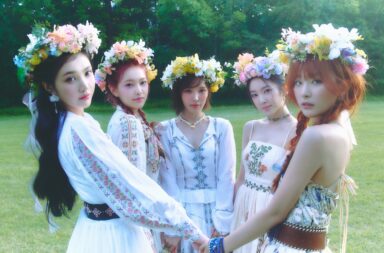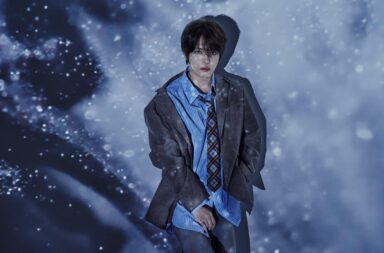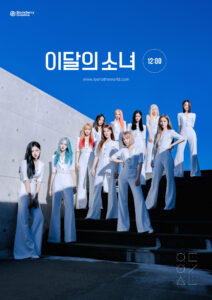
One of the most interesting moments in K-pop is when diving into a full release by a group whose appeal lies anywhere but their music. Loona is an ideal candidate for this, as their appeal can be accurately stated to be from everywhere but their music. Not to say their previous releases have been lacking, but one is far more likely to become a Loona stan from their intricate choreography, solo debuts, subunits, or sprawling mythology and universe, which makes their latest EP, 12:00, an interesting experience.
The aspect of 12:00 (pronounced “Midnight”) that defines it, for better and worse, is that it is inarguably two radically different EPs hot-glued together. The first two and penultimate two tracks are very much in the vein of experimental edm that has come into vogue, while the middle three and final songs are sleek R&B with synth influences that place them closer to vintage pop than anything else. Quite apart from being a strange listening experience, the two halves are utterly discordant — in tone, in content, in production, and sadly, in quality. The end result is a very solid EP dragged down by its weaker half, like a bad partner on a group project.
The opening half of 12:00, and the one that title track “Why Not?” belongs to, is the experimental half. It is quite a unique sound, blending the concept of space disco and modern EDM. This is clearest in the intro, “12:00”, and “Why Not?”; the pair also doubling as siamese twin songs, but “Hide & Seek” and “OOPS!” carry the same aesthetic. The tracks are built primarily around synths, with a particular emphasis on giving them a spacey, futuristic bent, complete with sampling astronauts in the intro track, that feeds well into Loona’s general impression of being out of this world.
Unfortunately, that is the weaker half, mainly due to the poor production and construction of the tracks. Like many girl groups who have moved in this direction, there is a misconception that “noisy” is the same thing as “experimental”. “Why Not?” just sounds sour, the biggest issue being the bass line. Being placed so prominently in the mix, the rubbery, warped sound is a literal headache. The sourness repeats on “Hide & Seek”, as does the chanting chorus. “OOPS!” avoids that issue, but is bloated with percussion and skittering hi-hats that have much the same effect. The songs are just crowded with too many layers turned up too high for them to come off as anything but a vaguely melodic din.
All three songs also share the issue of the construction. While noisy, atonal, and criminally underusing Loona’s vocals, they do build a certain amount of tension, the choruses on all three are utterly lackluster and instantly grind all momentum to a stop. Even if this sound appeals to you, the inability to maintain forward movement would kill any desire for a repeat listen. And, more than anything, that is the experimental half’s fatal weakness. They are edgy and exciting, but the instant one is over, it is gone from the mind. For better or worse, nothing here makes the audience feel compelled to go back and hear it again.
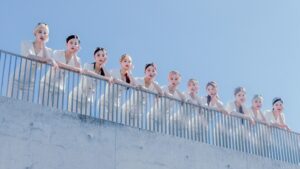
This is a shame, as the experimental tracks have the more interesting lyrical concepts. “Why Not?” is a fairly generic self-empowerment ballad, positioning Loona as asking why they shouldn’t go ahead and be who they want to be — wild, free, and unrepentant — and never getting an answer. “OOPS!”, while being the weakest track on 12:00, has the best idea, a bitingly sarcastic monologue to the ex who won’t take a hint and leave you alone, framing it all as accidents. “Hide & Seek” is the typical role-reversal of the girl pursuing the guy, but their delivery is so overblown that it shifts the song into a borderline-stalker anthem covered in glitter.
The second half of 12:00, consisting of “Voice”, “Fall Again”, “Universe”, and “Star”, is gorgeous. Musically pulling from vintage pop sounds for a dreamy, classic aesthetic, these songs lean hard into silk hiding steel. The production here is lush, sweet, and romantic, but built around the unmoving center of Loona’s vocals. The synths are softer, and played against more organic instrumentation such as strings and an acoustic guitar, for a more intimate, personal sound.
This half also manages to be sleek and polished without being sterile, relying on Loona’s delivery to strike the right emotional chord. The tone is best described as “hope after tragedy”, with Loona recovering from a loss and pushing to move forward. This comes out strongest on “Voice” and “Star”, the latter an English version of the former. The instrumentation is darker and brooding, but there is enough groove and 80s flavor to provide a lighter counterpoint. “Fall Again” sounds dreamy and romantic, but the lyrics show Loona dealing with memories of a relationship and trying to make peace with them — “Fall Again” applying both to falling emotionally and the way seasonal events can druge things back up. Even “Universe”, on paper a pure silly love song, has an overwhelming aura of sadness over it, derived entirely from Loona’s breathy, wistful vocals.
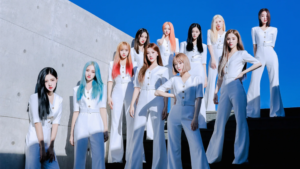
The most striking difference, though, between the R&B half and the experimental songs, is that these four are compelling. The rhythmic shifts, the repeated usage of steady, driving beats, the gentle earnestness of the vocal performances, these will entice the listener to listen over and over.
It is easy for softer songs to float on one ear and out the other, but these four stick in the mind, having vocal phrases and hooks with enough bite to pop against the sumptuous elegance. Contrast that with “Why Not?”’s repeated “dum di dum” chorus, which is much catchier but also extremely irritating. The tracks make the audience want to pick them apart, to note how “Voice” is more intimate while “Star” is more buoyant, how the sighs in “Universe” melt into the larger production, to clock the moment when the memories of “Fall Again” shift from bitter to bittersweet. The experimental half makes you show up, while the R&B songs entice you in.
12:00 is, quite literally, a mixed bag. It contains two disparate sounds, with two disparate tones, and offers two very disparate ways forward for Loona musically. One can only hope they follow the path of engaging music and proper production.
(Images via BlockBerry Creative, YouTube)

